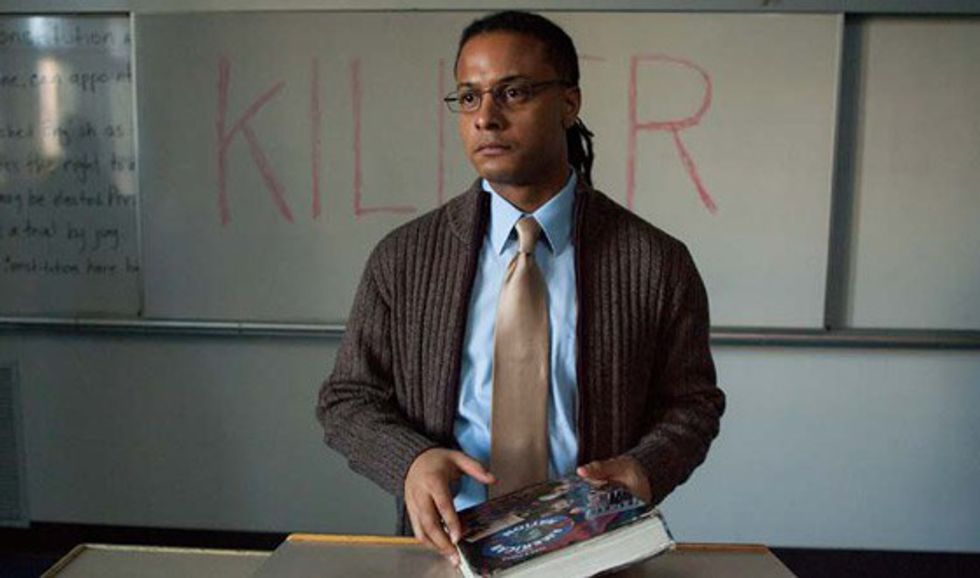Colson Whitehead (who has expressed disdain that his celebrity look-alike appears to be "that creepy teacher" from season 1 of The Killing) is the author of 6 major novels, including the critically acclaimed "The Underground Railroad."
He writes as a literary author, or as Glen Duncan, author of the New York Times's article " A Plague of Urban Undead in Lower Manhattan," someone who, "writes with the intent of using more complex forms of language to express difficult ideas and who expects the reader to take time to follow the complexities incorporated in the author's work."
That's what makes "Zone One" so interesting. Clearly a piece with all the trademarks of a sci-fi, the novel has a persistent complexity that is often lacking in genre fiction. Combing genre and literary fiction isn't something commonly seen in the literature scene, and Duncan describes Whitehead's genre-bending as "an intellectual dating a porn star," while also asking the question, "what's in it for the porn-star?" Or, more plainly, why would a literary author write in genre fiction? Toying with the idea of chalking it up to increasing the size of Whitehead's readership, writer Glen Duncan states that "[Whitehead] is always going to have more to [plot] than the dictates of genre allow… we get, in short, an attempt to take the psychology of the premise seriously, to see if it makes a relevant shape."
"Zone One"takes place over three days, though Whitehead takes his readers through a story that spans far past that brief plotline. The novel focuses on Mark Spitz, a sweeper (a part of the new citizen military) tasked with exterminating leftover zombies (termed "skels") from Manhattan.
Spitz is a strict adherent to mediocrity, prone to introversion and flashbacks even in the most intense situations. Existential, poignant, and often tragically longing reflections on society, on the self, and circumstance pervade the novel from beginning to end. As Charlie Anders writes, "'Zone One' shows how life after the zombie apocalypse turns everybody into a kind of zombie." In a Kafkaesque manner, Whitehead manages to establish the hum-drum within a post-apocalyptic world. Survivors are prohibited from looting goods from companies who have not "sponsored" the revitalization effort. While Spitz acknowledges some surely have caches of hoarded loot tucked away within the sweep zones, the climate of the novel conveys a tangible feeling of the burden of bureaucracy, of rules preventing the uninhibited human nature present even within a society with a government that is barely operational.
In one particularly clever analogy, audiences can't help but see the similarities between "stragglers" and survivors. Stragglers are skels that the survivors have established to pose no risk to humans. Instead of attacking humans, they simply stand frozen in place. Spitz reflects on the meaning of these places to the stragglers. Was this someplace important to them, or just perhaps a random spot they managed to find before the virus burned through their nervous systems?
Stragglers come to represent the dangers of "clinging to the past." In fact, the past is brought up again and again. Time to loses meaning as flashbacks blend fluidly into developing situations, leading the audience to experience a sort of second-hand trauma induced Post-Apocalyptic Stress Disorder (PASD) present within all survivors.
Personally, "Zone One"took me on a not-so-lucid journey through the life of someone managing to eke out a living in a world filled with hostile empty faces, individuals hollowed out by the stress of living, and harrowed, lifeless husks anchored to an arbitrary point in the past, waiting for this life to pass. Whitehead creates an environment where time is not so much linear, but instead acts as a dimension through which the protagonist escorts us as he would a visitor around a house. He gives an incoherent tour, with the smallest details spawning entire pages of digression. Yet this digression seemed particularly relevant; it was the story. Whitehead creates a palpable distance between Spitz and the audience, and transforms this distance to reflect an individual's distance to society, posing the question, "within a societal context, of what importance is the story of the individual?" The horrific and, as always, beautifully written, conclusion to the novel (no spoilers) suggests, quite flatly, that it might not.
"Zone One"was a brilliant, dizzying, and thoroughly devastating novel that poses existential questions not found within the world of genre fiction. The blending of literary and genre work done by Whitehead has been very successful and has resulted in one of my favorite reads.




















